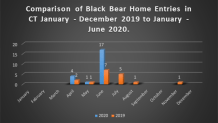Increasing interactions between people and black bears in Connecticut are leading to "unprecedented" levels of complaints and requests for help, the Connecticut Department of Energy and Environmental Protection announced Tuesday.
DEEP has received more reports of bears entering homes this year than in any previous years, the agency said. Through July 8, DEEP has received 25 reports of bears entering homes putting Connecticut on track to triple the average number of home entries from the last two years.
In June, 17 bear home entries were reported, which is the total number reported for all of 2019, DEEP said in a release.

DEEP said bears that consume human food from places like bird feeders, trash and pet food become comfortable around people. Those food-conditioned bears then "pose a greater risk to public safety and often cause more property damage to houses, cars, pets and livestock," DEEP said in its release.
“Black bears should never be fed – either intentionally or unintentionally,” DEEP Wildlife Division Director Jenny Dickson said in a statement . “Bears that are attracted to homes by easily-accessible foods lose their fear of humans. Such bears spend more time in neighborhoods and near people, increasing risks to public safety, the likelihood of property damage, and the possibility that the bears may be hit and killed by vehicles.”
If you encounter a bear, DEEP said you should make your presence known by yelling or making load noises, and if the bear does not retreat, you should slowly leave the area or go indoors.
Local
DEEP provided a number of tips to cut down on dangerous interactions with black bears:
1. NEVER feed bears.
2. Do not feed birds in the spring (starting in late March), summer, and early fall. Clean up spilled seed from the ground.
3. Store garbage in secure, airtight containers inside a garage or storage area. Adding ammonia to cans and bags will reduce odors that attract bears. Periodically clean garbage cans with ammonia to reduce residual odor. Garbage for pickup should be put outside the morning of collection and not the night before.
4. Do not store leftover bird seed or recyclables in a porch or screened sunroom as bears can smell these items and will rip screens to get at them.
5. Supervise dogs at all times when outside. Keep dogs on a short leash when walking and hiking. A roaming dog might be perceived as a threat to a bear or its cubs. (Dogs are required to be on a leash when visiting State Parks, State Forests, and Wildlife Management Areas. Check dog and leash regulations for town properties, land trusts, and other public properties before heading to those areas.)
6. Do not leave pet food outdoors or feed pets outside.
7. Use electric fencing to protect beehives, agricultural crops, berry bushes, chickens, and other livestock.
8. Keep barbecue grills clean. Store grills inside a garage or shed.
9. Avoid placing meat scraps or sweet foods, such as fruit and fruit peels, in compost piles.
DEEP said if a bear becomes aggressive, call DEEP's 24-hour dispatch line at 860-424-3333. If you want to report a bear sighting, you can call DEEP at 860-424-3011 or use its website here.



